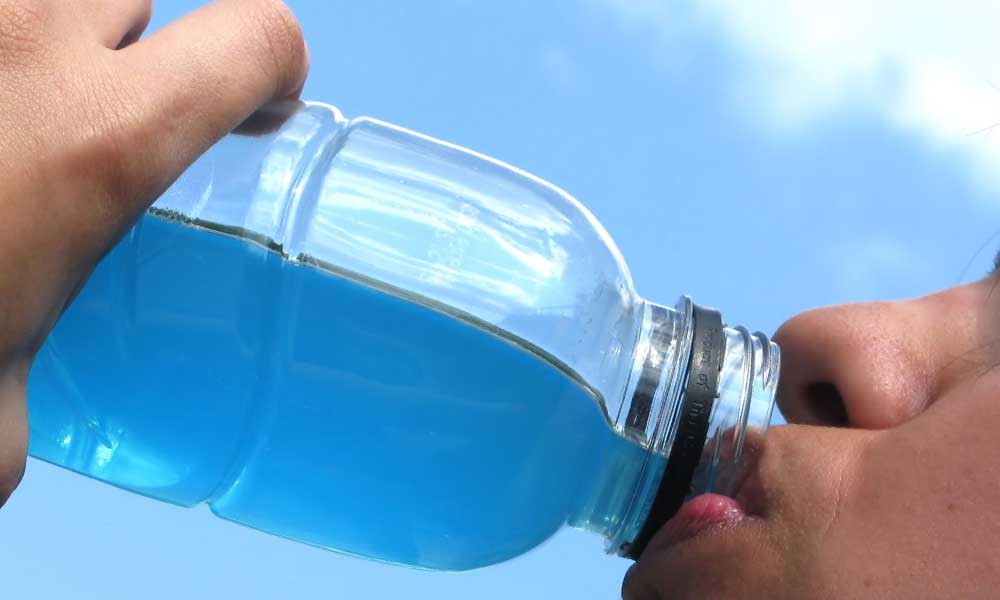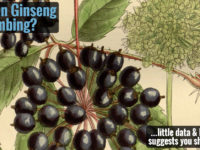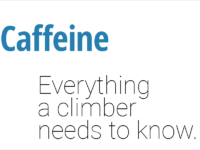Sports drinks have their time and their place. As eager as I am to extol their performance benefits, they are not helpful in all situations. Like any other aspect of nutrition (or training), it’s worth understanding the context of timing sports drinks so you know when it’s good to use one and when it may not be useful.
Before we get into timing, though, let’s address the most basic question of all…
Do Climbers Need Sports Drinks At All?
Yes! Climbers can benefit from sports drinks as much as any athlete. Our body can only store limited amounts of carbohydrates, and aside from the even more limited store of phosphocreatine) they are the only nutrient that can power anaerobic activity. To give this statement some context, fat only has approximately 40% of the energy potential compared to the aerobic oxidation of carbohydrates and 17% of the energy potential as anaerobic glycolysis (breaking carbs down into lactate for energy)—which means fat just doesn’t have the capacity to rapidly churn out energy as carbohydrates.
Unfortunately, the carbohydrates stored as muscle glycogen are limited, and limited only to the muscles they are stored in. When a specific muscle runs out, it cannot draw from any other muscle’s supply; the only place it can possibly draw more carbohydrates from is the blood—but during exercise, the body tries to preserve blood glucose from the brain to prevent bonking. The only way to overcome this limitation is to increase blood glucose to a level where the body/brain recognizes there is glucose to spare for both the muscles and the brain.
Sports drinks—which provide an easy to absorb source of glucose and fructose—do exactly that. The glucose directly boosts blood glucose levels and the fructose indirectly does by regenerating liver glycogen that is then released into the blood as glucose. Thus, sports drinks provide an external source of carbohydrates that allow the muscles to continue anaerobic activity even when glycogen depletion (and the glycogen sparing that begins long before depletion) occurs.
So yes, climbers can benefit from sports drinks.
When Should I Use a Sports Drink?
There aren’t hard and fast rules for this, but there are some good general guidelines. Foremost amongst them, you should consider using a sports drink whenever you…
- Climb or train for more than 2 hours straight.
- Climb or train and have not eaten in the previous few hours.
- Need absolute top performance (projects, comps, etc.).
In the first scenario, you should expect that muscle glycogen will be depleted by the time you enter your third hour, and since we can also expect your creatine phosphate to be mostly expended it’s likely your power will have significantly dropped. A sports drink can’t make you feel as fresh as you did the first hour, but if you consume one throughout your multi-hour training session you will keep your power much higher for much longer.
In the second scenario, you are beginning your climbing session in an energy deficit that will not lend itself to power or power endurance. The calories from a sports drink will help you remain focused and able to climb or train at your best ability.
In the third scenario, we’re seeking every small edge possible and won’t turn down the potential 2-3% performance boost a sports drink could offer. This boost may not be large enough to mandate using a sports drink whenever you climb or train, but when it’s all on the line it could be the small difference you need to succeed.
Beyond these scenarios, you have to play it by ear (and preference) because there’s no strong rationale either for or against as long as you’re accounting for the extra energy in your daily tally. Do you feel like you’re flagging too early to call it a day? Do you feel like you’re not as powerful as normal? Do you have one extra-hard training day, but it’s relatively short? A sports drink could help… or it might not. You just have to see for yourself.
When Should I Not Use a Sports Drink?
There are only two situation I can think of when you should really not use a sports drink:
- When the primary reason you’re exercising is to lose weight.
- When you are training purposely in a glycogen-depleted state (or attempting to deplete glycogen for such training).
If your exercise goal is weight loss, then a sports drink will directly hinder your goal by reducing overall fat oxidation during exercise (in a small but meaningful way) and by increasing your daily calories in a unsatiating way. If you are exercising for weight loss, though, then your goal is implicitly not performance (because strategies to maximize performance and weight loss are mutually exclusive); if you try to account for both, you will compromise your results from both.
This is not to say you cannot straddle the line between the two—many climbers might prefer to be able to continue climbing and training relatively hard even when trying to lose weight and don’t want to sacrifice too much power or power endurance. If this statement applies to you, and you’re in one of the three situations mentioned above, then the trade-off may be worth it. No matter what, though, it’s always a trade-off; you cannot maximize both your performance and weight loss potential with the same strategy.
The second scenario deals with a training concept known as “train low, compete high” that attempts to biohack our body into increasing fat oxidation through glycogen-depleted training without sacrificing carb oxidation in the process. A whole article can be written on this, so I’m not going to go into any details here except to say that I find it questionable whether this strategy would help a climber because most research indicates that if this strategy works for anyone, it would be endurance athletes (which climbers are not). Still, if you are trying to deplete glycogen or train for the purpose of increasing fat oxidation, then making carbohydrates available with a sports drink is directly opposed to your goal.
How Much Sports Drink Should I Consume?
This is a tricky question because it really depends on what you’re doing, how hard you’re doing it, and for how long. The studies that show the most benefit from supplying maximum carbs per hour (90 grams: 60 grams glucose, 30 grams fructose) dealt with cyclists in endurance situations. Do climbers need 90 grams of carbohydrates per hour for optimum performance? Probably not—but 45-60 grams per hour isn’t unrealistic given the high anaerobic needs of climbing.
Your best bet is to gauge your needs based on the questions I opened with:
- What are you doing? (Climbing, training, a little of both)
- How hard are you doing it? (Are you spending a recreational afternoon with some friends? Giving multiple burns to your project? Training intensely?)
- For how long are you doing it? (1 hour? 2 hours? 6 hours?)
The longer you’re doing something, and the more intensely you’re doing it, the more carbohydrate you should get from a sports drink every hour. A grueling multi-hour training session may call for 90 grams per hour. A recreational afternoon climb may dictate only 30 grams per hour (or you may just eat normal carb-rich snacks like fruit). A tough climbing session where performance and power endurance are essential may call for 60 grams per hour.
The longer and harder you exercise, the more carbohydrate you need on a scale from 30 grams per hour to 90 grams!
Personally, I usually mix my drink in such a way as to provide about 45 grams of carbohydrates per hour. I usually boulder for about 2 hours at a semi-intense pace, and the 90 grams of carbohydrates (over two hours) keeps me feeling pretty fresh all the way until my muscles fail me from general fatigue, not low energy.
Final Word: Consider Your Energy Balance
I hope most of your questions about sports drink timing have been answered by now, but I wanted to leave you with one final concept: energy balance.
Most people aware of calories and balancing intake and expenditure only consider it across 24 hours—in other words, they tally everything up at the end of the day and see if it’s a positive or a negative number. Overall, this equation will certainly predict weight gain or loss, but it may not be the most efficient way of either gaining muscle or losing fat. If, on the other hand, you consider when your body needs energy and provide it during that moment, you keep your energy balance curve relatively smooth, suppressing both the muscle breakdown that occurs during an energy deficit and the fat storage that occurs during an energy excess.
Carbohydrates from a sports drink are fuel for exercise, nothing more, and all of the strategies above ensure that your energy balance curve will remain relatively smooth. They were not created with that particular goal in mind, they just happen to align because it makes sense to provide your body with fuel when it needs it and not after you’ve already finished!
Many athletes (runners are particularly notorious for this) “exercise so they can eat”, but that’s pretty backwards thinking. As Dan Bernadot puts it, that’s like taking a car on a roadtrip and filling it up when you’ve reached the destination. If you want the most out of your climbing or training, you need to provide the fuel during the session.
So my final word is this: Even in the situations that don’t necessarily dictate using a sports drink, there’s still really no reason to not use one either. At the very least, you’re providing fuel exactly when your body needs it. It may not affect much, but if you’re good with nutrition (e.g., not exercising so you can binge afterwards) then it may lead towards meaningful improvements in body composition and energy and there’s no downside for trying.














